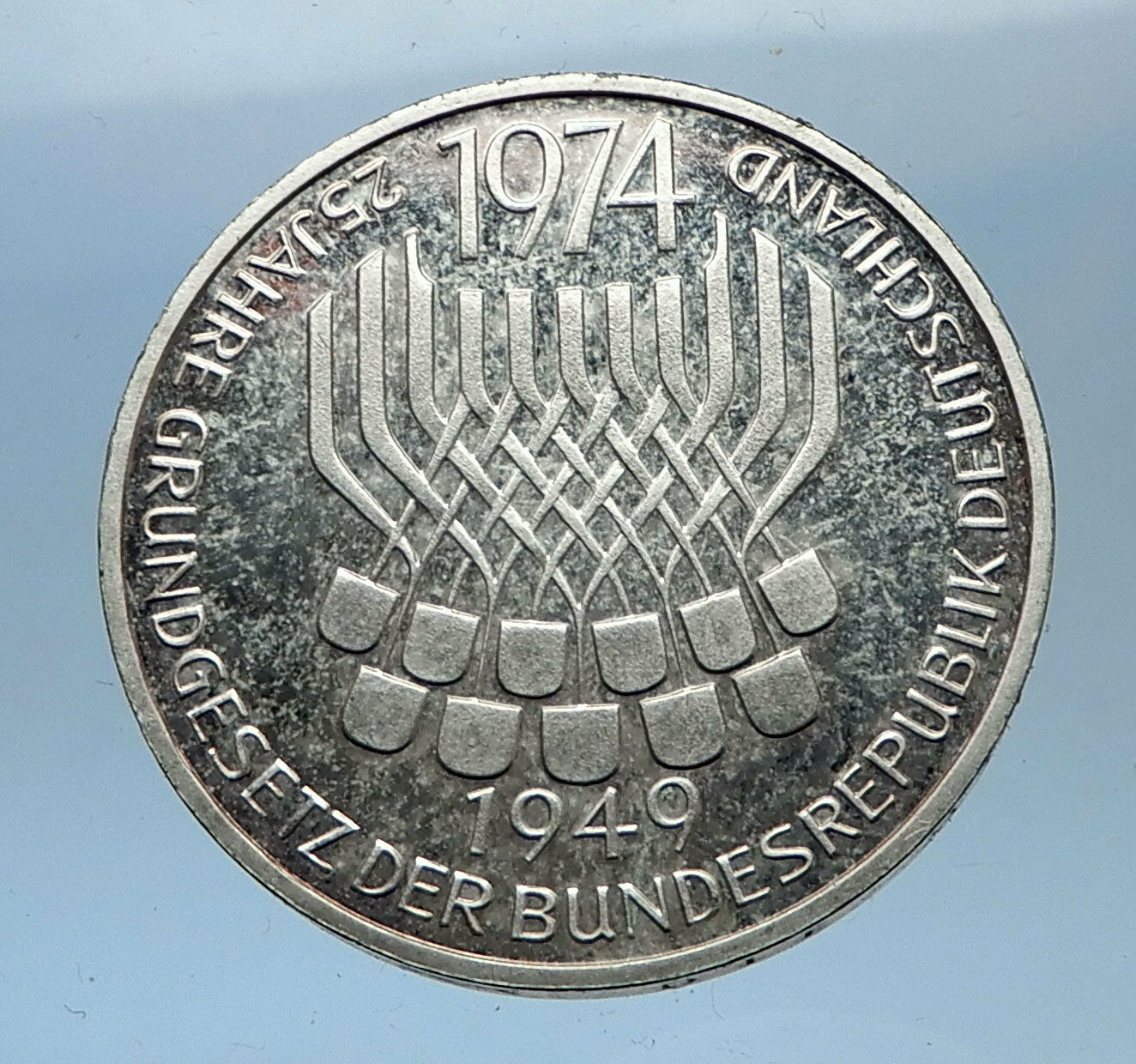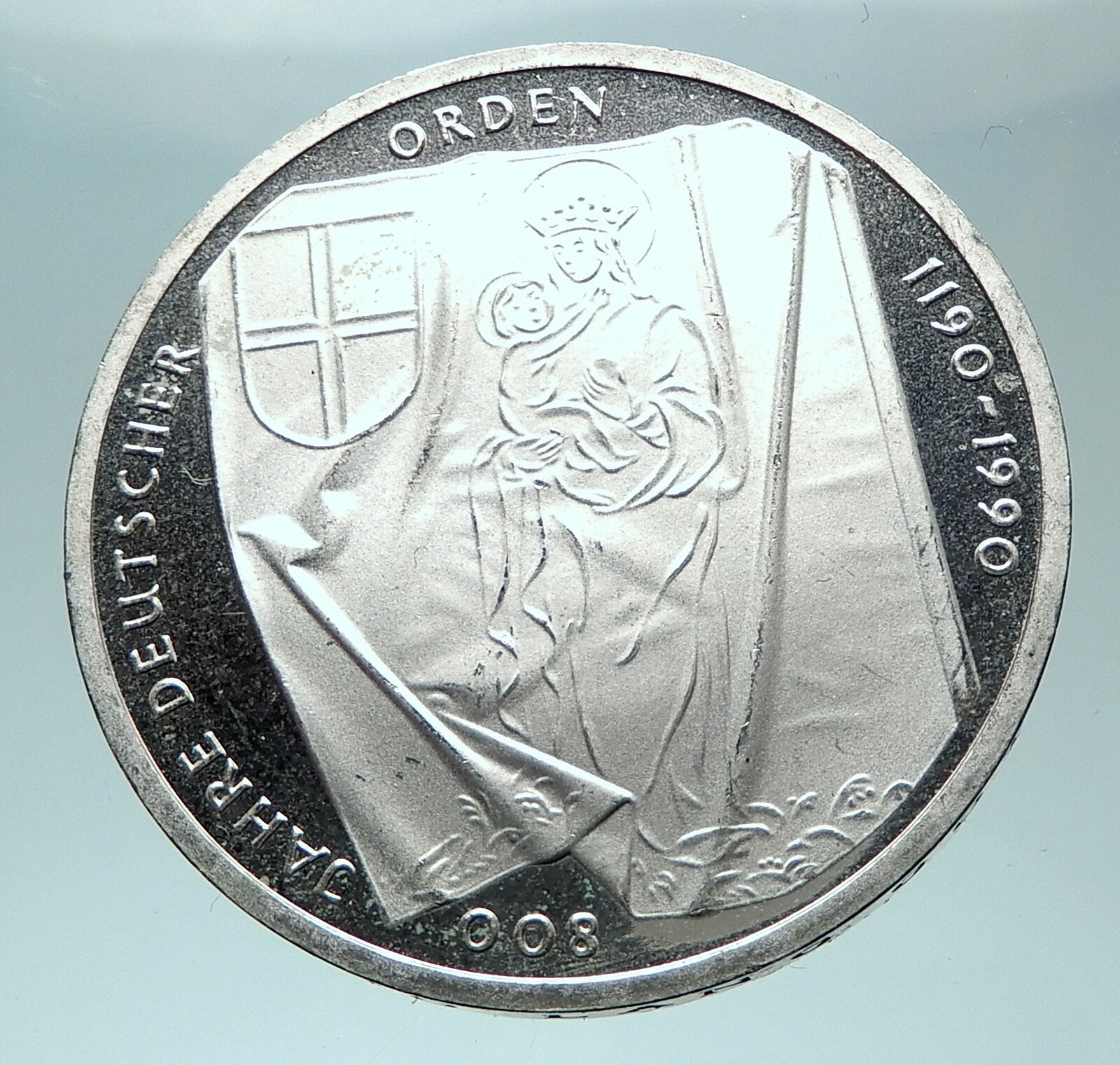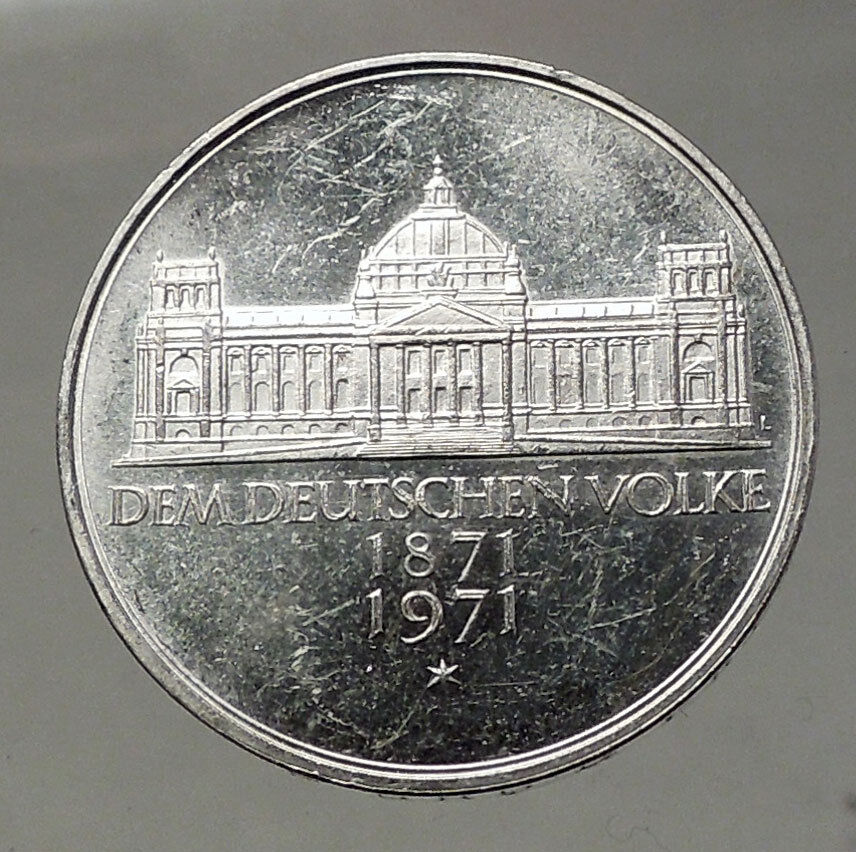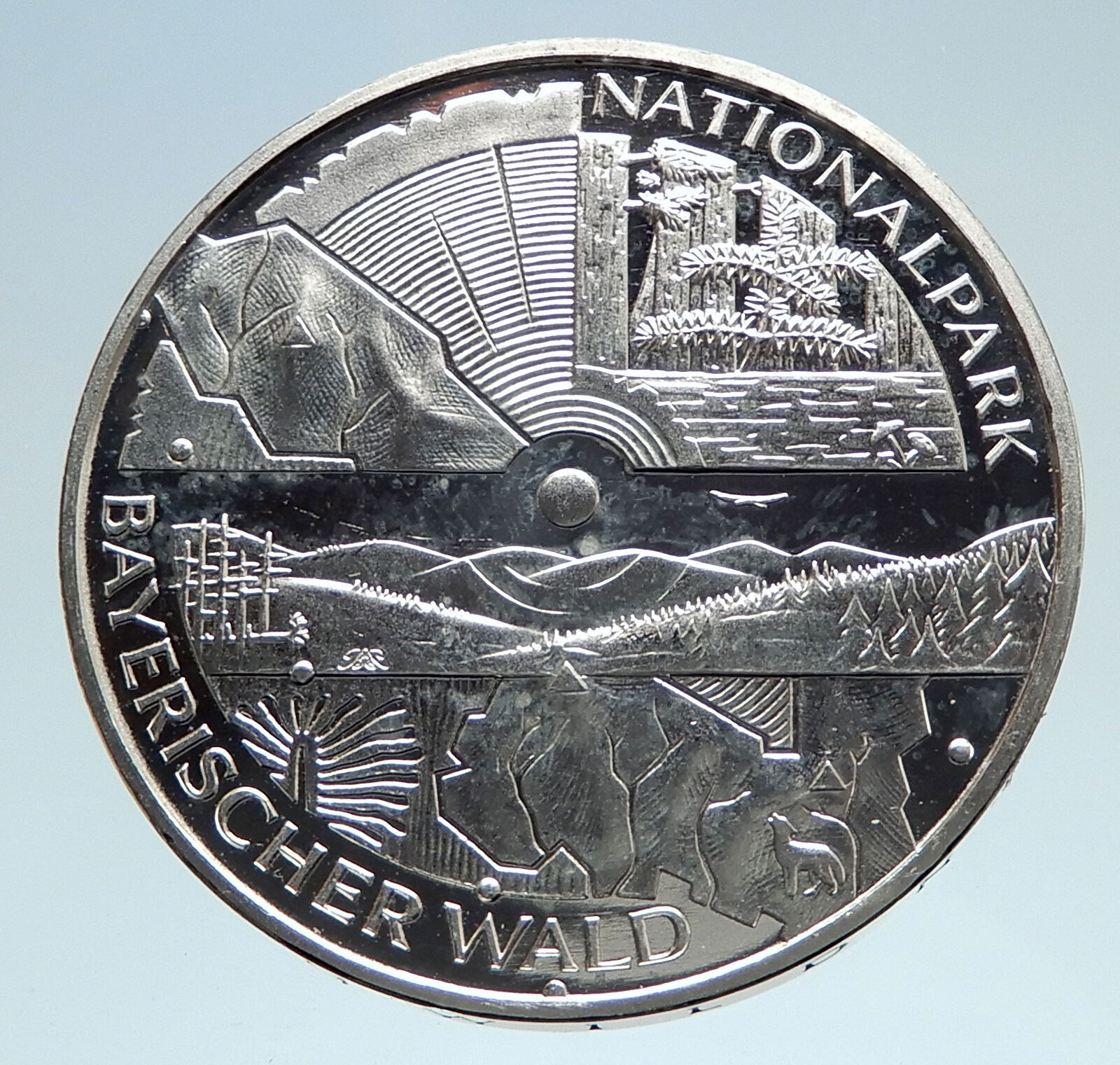|
Germany – Saarland, 50th Anniversary of German Control
2007 G Proof Silver 10 Euros 32mm (18.15 grams) 0.925 Silver (0.5319 oz. ASW)
Reference: KM# 263
BUNDESREPUBLIK 10 EURO DEUTSCHLAND 2007 G, Eagle and EU stars.
50 JAHRE BUNDESLAND SAARLAND, Modern town view, four stylized heads.
Edge Lettering: DEUTSCHLAND*FRANKREICH*EUROPA*
You are bidding on the exact item pictured, provided with a Certificate of Authenticity and Lifetime Guarantee of Authenticity.
 Saarland is a state of Germany. Saarland is located in western Germany covering an area of 2,570 km2 (990 sq mi) and a population of 995,600 (2015), the smallest German state in both area and population apart from the city-states of Berlin, Bremen, and Hamburg. Saarbrücken is the state capital and largest city, while other major cities include Neunkirchen and Saarlouis. Saarland is surrounded by France to the west and south and the German state of Rhineland-Palatinate to the north and east. Saarland is a state of Germany. Saarland is located in western Germany covering an area of 2,570 km2 (990 sq mi) and a population of 995,600 (2015), the smallest German state in both area and population apart from the city-states of Berlin, Bremen, and Hamburg. Saarbrücken is the state capital and largest city, while other major cities include Neunkirchen and Saarlouis. Saarland is surrounded by France to the west and south and the German state of Rhineland-Palatinate to the north and east.
 Saarland was established in 1920 after World War I as the Territory of the Saar Basin, formed from land of Prussia and Bavaria occupied and governed by France and the United Kingdom under a League of Nations mandate. The heavily industrialized region was economically valuable due to the wealth of its coal deposits and location on the border between France and Germany. Saarland was returned to Nazi Germany in the 1935 Saar status referendum, becoming de jure part of Bavaria and de facto part of Gau Westmark. Following World War II, the French military administration in Allied-occupied Germany organized the territory as the Saar Protectorate from 1947, becoming a protectorate of France, and between 1950 and 1956 was a member of the Council of Europe. Saarland rejected the 1955 Saar Statute referendum, and joined the Federal Republic of Germany as a state on 1 January 1957. Saarland used its own currency, the Saar franc, and postage stamps issued specially for the territory until 1959. Saarland was established in 1920 after World War I as the Territory of the Saar Basin, formed from land of Prussia and Bavaria occupied and governed by France and the United Kingdom under a League of Nations mandate. The heavily industrialized region was economically valuable due to the wealth of its coal deposits and location on the border between France and Germany. Saarland was returned to Nazi Germany in the 1935 Saar status referendum, becoming de jure part of Bavaria and de facto part of Gau Westmark. Following World War II, the French military administration in Allied-occupied Germany organized the territory as the Saar Protectorate from 1947, becoming a protectorate of France, and between 1950 and 1956 was a member of the Council of Europe. Saarland rejected the 1955 Saar Statute referendum, and joined the Federal Republic of Germany as a state on 1 January 1957. Saarland used its own currency, the Saar franc, and postage stamps issued specially for the territory until 1959.
 Germany, officially the Federal Republic of Germany is a federal parliamentary republic in western-central Europe. It includes 16 constituent states and covers an area of 357,021 square kilometres (137,847 sq mi) with a largely temperate seasonal climate. Its capital and largest city is Berlin. With 81 million inhabitants, Germany is the most populous member state in the European Union. After the United States, it is the second most popular migration destination in the world. Germany, officially the Federal Republic of Germany is a federal parliamentary republic in western-central Europe. It includes 16 constituent states and covers an area of 357,021 square kilometres (137,847 sq mi) with a largely temperate seasonal climate. Its capital and largest city is Berlin. With 81 million inhabitants, Germany is the most populous member state in the European Union. After the United States, it is the second most popular migration destination in the world.
 Various Germanic tribes have occupied northern Germany since classical antiquity. A region named Germania was documented before 100 CE. During the Migration Period the Germanic tribes expanded southward. Beginning in the 10th century, German territories formed a central part of the Holy Roman Empire. During the 16th century, northern German regions became the centre of the Protestant Reformation. Various Germanic tribes have occupied northern Germany since classical antiquity. A region named Germania was documented before 100 CE. During the Migration Period the Germanic tribes expanded southward. Beginning in the 10th century, German territories formed a central part of the Holy Roman Empire. During the 16th century, northern German regions became the centre of the Protestant Reformation.
 The rise of Pan-Germanism inside the German Confederation resulted in the unification of most of the German states in 1871 into the Prussian-dominated German Empire. After World War I and the German Revolution of 1918-1919, the Empire was replaced by the parliamentary Weimar Republic. The establishment of the Third Reich in 1933 led to World War II and the Holocaust. After 1945, Germany split into two states, East Germany and West Germany. In 1990, the country was reunified. The rise of Pan-Germanism inside the German Confederation resulted in the unification of most of the German states in 1871 into the Prussian-dominated German Empire. After World War I and the German Revolution of 1918-1919, the Empire was replaced by the parliamentary Weimar Republic. The establishment of the Third Reich in 1933 led to World War II and the Holocaust. After 1945, Germany split into two states, East Germany and West Germany. In 1990, the country was reunified.
In the 21st century, Germany is a great power and has the world’s fourth-largest economy by nominal GDP, as well as the fifth-largest by PPP. As a global leader in several industrial and technological sectors, it is both the world’s third-largest exporter and importer of goods. Germany is a developed country with a very high standard of living sustained by a skilled and productive society. It upholds a social security and universal health care system, environmental protection and a tuition free university education.
Germany was a founding member of the European Union in 1993. It is part of the Schengen Area, and became a co-founder of the Eurozone in 1999. Germany is a member of the United Nations, NATO, the G8, the G20, and the OECD. The national military expenditure is the 9th highest in the world. Known for its rich cultural history, Germany has been continuously the home of influential artists, philosophers, musicians, sportsmen, entrepreneurs, scientists and inventors.
|





 Saarland is a state of Germany. Saarland is located in western Germany covering an area of 2,570 km2 (990 sq mi) and a population of 995,600 (2015), the smallest German state in both area and population apart from the city-states of Berlin, Bremen, and Hamburg. Saarbrücken is the state capital and largest city, while other major cities include Neunkirchen and Saarlouis. Saarland is surrounded by France to the west and south and the German state of Rhineland-Palatinate to the north and east.
Saarland is a state of Germany. Saarland is located in western Germany covering an area of 2,570 km2 (990 sq mi) and a population of 995,600 (2015), the smallest German state in both area and population apart from the city-states of Berlin, Bremen, and Hamburg. Saarbrücken is the state capital and largest city, while other major cities include Neunkirchen and Saarlouis. Saarland is surrounded by France to the west and south and the German state of Rhineland-Palatinate to the north and east.  Saarland was established in 1920 after World War I as the Territory of the Saar Basin, formed from land of Prussia and Bavaria occupied and governed by France and the United Kingdom under a League of Nations mandate. The heavily industrialized region was economically valuable due to the wealth of its coal deposits and location on the border between France and Germany. Saarland was returned to Nazi Germany in the 1935 Saar status referendum, becoming de jure part of Bavaria and de facto part of Gau Westmark. Following World War II, the French military administration in Allied-occupied Germany organized the territory as the Saar Protectorate from 1947, becoming a protectorate of France, and between 1950 and 1956 was a member of the Council of Europe. Saarland rejected the 1955 Saar Statute referendum, and joined the Federal Republic of Germany as a state on 1 January 1957. Saarland used its own currency, the Saar franc, and postage stamps issued specially for the territory until 1959.
Saarland was established in 1920 after World War I as the Territory of the Saar Basin, formed from land of Prussia and Bavaria occupied and governed by France and the United Kingdom under a League of Nations mandate. The heavily industrialized region was economically valuable due to the wealth of its coal deposits and location on the border between France and Germany. Saarland was returned to Nazi Germany in the 1935 Saar status referendum, becoming de jure part of Bavaria and de facto part of Gau Westmark. Following World War II, the French military administration in Allied-occupied Germany organized the territory as the Saar Protectorate from 1947, becoming a protectorate of France, and between 1950 and 1956 was a member of the Council of Europe. Saarland rejected the 1955 Saar Statute referendum, and joined the Federal Republic of Germany as a state on 1 January 1957. Saarland used its own currency, the Saar franc, and postage stamps issued specially for the territory until 1959.  Germany, officially the Federal Republic of Germany is a federal parliamentary republic in western-central Europe. It includes 16 constituent states and covers an area of 357,021 square kilometres (137,847 sq mi) with a largely temperate seasonal climate. Its capital and largest city is Berlin. With 81 million inhabitants, Germany is the most populous member state in the European Union. After the United States, it is the second most popular migration destination in the world.
Germany, officially the Federal Republic of Germany is a federal parliamentary republic in western-central Europe. It includes 16 constituent states and covers an area of 357,021 square kilometres (137,847 sq mi) with a largely temperate seasonal climate. Its capital and largest city is Berlin. With 81 million inhabitants, Germany is the most populous member state in the European Union. After the United States, it is the second most popular migration destination in the world. Various Germanic tribes have occupied northern Germany since classical antiquity. A region named Germania was documented before 100 CE. During the Migration Period the Germanic tribes expanded southward. Beginning in the 10th century, German territories formed a central part of the Holy Roman Empire. During the 16th century, northern German regions became the centre of the Protestant Reformation.
Various Germanic tribes have occupied northern Germany since classical antiquity. A region named Germania was documented before 100 CE. During the Migration Period the Germanic tribes expanded southward. Beginning in the 10th century, German territories formed a central part of the Holy Roman Empire. During the 16th century, northern German regions became the centre of the Protestant Reformation. The rise of Pan-Germanism inside the German Confederation resulted in the unification of most of the German states in 1871 into the Prussian-dominated German Empire. After World War I and the German Revolution of 1918-1919, the Empire was replaced by the parliamentary Weimar Republic. The establishment of the Third Reich in 1933 led to World War II and the Holocaust. After 1945, Germany split into two states, East Germany and West Germany. In 1990, the country was reunified.
The rise of Pan-Germanism inside the German Confederation resulted in the unification of most of the German states in 1871 into the Prussian-dominated German Empire. After World War I and the German Revolution of 1918-1919, the Empire was replaced by the parliamentary Weimar Republic. The establishment of the Third Reich in 1933 led to World War II and the Holocaust. After 1945, Germany split into two states, East Germany and West Germany. In 1990, the country was reunified.




